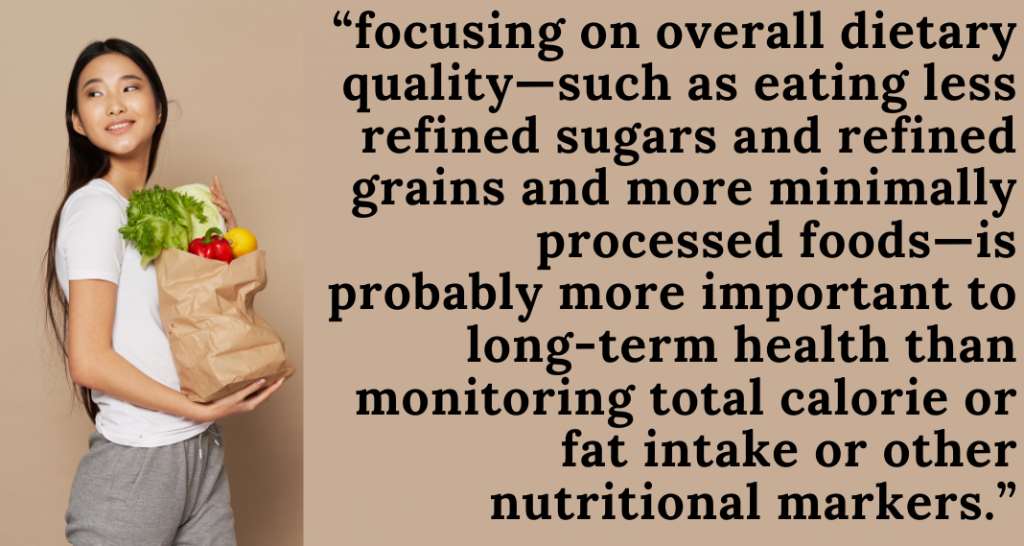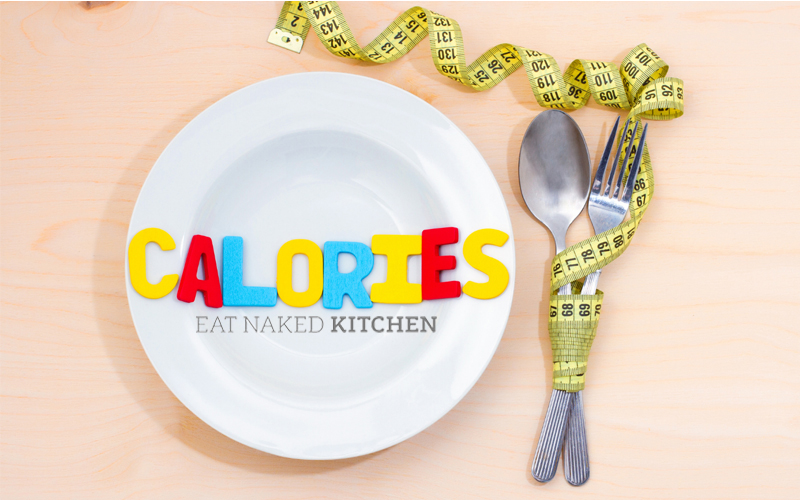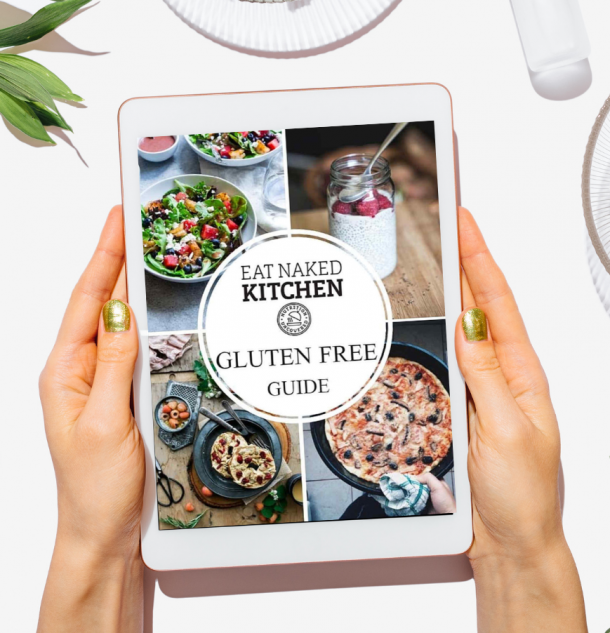in theIf I told you that you could choose between a handful of carrot sticks and two non-fat chocolate chip cookies, that each has the same number of calories and would have the exact same impact on your waistline, which would you choose?
C’mon, be honest. We’d all pick the cookies.
And if we listened to a lot of the messages out there about weight, then that would be the logical choice. After all, isn’t it all about calories-in calories-out, regardless of where those calories came from?
The problem is, calories are just one itty bitty part of the story.
Here’s the deal. A calorie is not just a calorie. It’s what your body does with that calorie that counts, and what determines this factor is the quality of the food.
Consider your afternoon snack. You have two options: a carrot, or a bag of potato chips.
Let’s say you pick the carrot. When you’ve finished with it – a lower calorie, higher quality snack – you’re probably done with carrot. Unless you’ve got a “thing” for carrots you likely won’t want to eat another, and another, and another. You’re satisfied and go on with your afternoon.
Now let’s say you pick the potato chips. When you’ve finished a single serving (and who eats just a single serving?) of this higher calorie, lower quality snack, are you done? Probably not. My guess is you blow through several servings, and then with your salt fix satisfied you start craving something sweet to balance it out.
But wait a second…
If it’s about the amount of calories and not the quality of the food, shouldn’t you be stuffed full after the higher calorie chips? Shouldn’t you be hungry and craving more after the carrot? It doesn’t work that way. The carrot – whole, unrefined – is giving your body real nutrients.
The potato chips – refined and highly processed – are just teasing your taste buds without any real nutrition.
Do they have calories? Heck yeah. But do they actually feed and nourish you? Not at all. In fact, they’re often loaded with chemicals called excitotoxins that can further stimulate your appetite.

Don’t just take my word for it. A recent study published in The New England Journal of Medicine showed that “focusing on overall dietary quality—such as eating less refined sugars and refined grains and more minimally processed foods—is probably more important to long-term health than monitoring total calorie or fat intake or other nutritional markers.” (Daniel Fromson, The Atlantic, 10 Foods That Drive Weight Gain and Loss Identified by Harvard)
Quality is top of my list of reasons for not paying attention to calories, but here are some other important pieces to the puzzle:
- We all know that our bodies use some calories as energy and stores others as fat. But here’s the important thing – it’s not JUST about the volume of those calories. A lot of it is about how the body is using them. Lower-calorie foods that spike blood sugar levels and cause a surge in insulin store more fat than higher-calorie foods that allow for a slower energy release and do not spike insulin.
- High-quality, nutrient dense foods that are higher-calorie actually satisfy you for longer, so you eat less overall. Lower-calorie foods that spike blood sugar levels create blood sugar crashes, which cause powerful cravings and inspire binging.
- The digestion of fat triggers our satiation mechanism. This is why fat-free foods are so unsatisfying and we tend to eat more and more of them, looking for that feeling of fullness.
- Our state of mind affects how our bodies use the food we eat. Regardless of how many calories you consume, being in a stress-state (sympathetic nervous system dominance) compromises digestion and inspires our body to store fat; being in a relaxed state (parasympathetic nervous system dominance) allows our body to digest fully and mobilize stored weight.
As we saw in the example of the carrot vs. potato chips, food is about more than just energy potential (or, calories). It’s also about nourishment, building and healing the body, and providing nutrients for all the vital functions that keep us alive and thriving. When we reduce our food to calories, we are discrediting all of its other critically important roles.
If this sounds intriguing but complicated, and you’re ready to let go of calories in favor of a nutrient-dense real foods diet that will shed the pounds without going hungry, join us in the Real Food Reboot Program.








This is 100 percent true. I do not count calories myself, unless maybe you are a competitor. But if you are eating real nutritious foods there really is no need to worry about counting since these foods will keep you full and your body won’t be fooled by fake weird calories in processed foods.
This is 100 percent true. I do not count calories myself, unless maybe you are a competitor. But if you are eating real nutritious foods there really is no need to worry about counting since these foods will keep you full and your body won’t be fooled by fake weird calories in processed foods.
Mis-leading. In terms of weight loss, for all practical purposes, a calorie is indeed a calorie. And there nuances and variables? Yes. Are they significant in pure terms of weight/fat loss? Absolutely note.
In practical mathematical terms, a calorie is a calorie. If my TDEE is 2,500, but I only consume 2,000 calories — it doesn’t matter whether those 2,000 calories come from pizza, cookies and cheeseburgers or if it’s from kale, turkey and lettuce. I’m going to lose weight either way. Why? Because the calories are what matters – ergo, a calorie is a calorie.
To say that the calories are an “itty bitty” part of the picture is completely stupid. Calories aren’t an “itty bitty” part the picture – they ARE the picture. All the other things are just smaller parts of the picture. But in the end, it comes back to calories.
Yes, some caloric sources will make you feel fuller (satiety). But they’re still just calories. If you maintain your calorie goals, it doesn’t matter where the calories come from — in pure terms of fat loss, that is.
Article like this just mis-inform people and cause confusion.
One of the key pieces you’re missing here, Chase, is how the body works with the food we ingest and the hormonal cascade that ensues. Even weight watchers has recognized that a calorie is NOT a calorie and has adjusted their point system accordingly. A non-fat cookie does a very different thing in your body than an apple, even though calorically they may be the same. Part of it is about satiety, but a bigger part is about the hormonal response to the food consumed.
Myth: Hormones affect body weight; therefore, managing your hormones is more important than calories.
Hormones like leptin, cortisol, thyroid, insulin, and testosterone all affect how many calories you burn and how much fat and muscle you lose while dieting.108-111 They also affect how much muscle or fat you gain while overeating.
Some people claim that because of this, you shouldn’t worry about your calorie intake, but about managing and “optimizing” your hormones. Then they usually recommend something like the following:
A special diet designed to support hormone production.
Avoiding certain foods or macronutrients because they boost estrogen levels or depress testosterone production, or affect some other hormone.
Supplements, of course.
Hormones matter, but there’s no evidence you can change them in a way that will help you lose weight without creating a calorie deficit.
When you cut your calorie intake, hormones like leptin and thyroid drop, which makes you burn fewer calories.112,113
However, the changes are usually small, and they don’t happen unless you’re also in a caloric deficit. There’s also no evidence that someone who’s eating enough calories to maintain their weight will suddenly lose fat if they “optimize” their hormones.
Massively cutting calories, overexercising, depriving yourself of sleep, living a stressful lifestyle, and other unhealthy behaviors can hinder your ability to lose fat. That doesn’t change the fact that you still have to be in a caloric deficit.
Calories are NOT what creates body fat tissue. Energy is NOTHING MATERIAL. Stock piling referncez to non scientific fields that explain nothing is NOT science. It only satisfies the referencez fetish of scientifically illiterate McFonald groupies, who follow a scientifically il,iterate guru……
This is just wrong in terms of pure fat lose. Again, if you want to be healthy then eat the apple, but healthy and fat loss aren’t the same thing. There are skinny unhealthy people. If your daily maintenance is 2500 and you eat 2000 calories then you will lose weight. It doesn’t matter at all what you eat for those 2000. The article is full of “probably” do this or “probably” do that. That’s about discipline not pure fat loss/gain. Counting calories to some degree is important. You probably know how many MPG your car gets and how big the tank is and how to fill it so why wouldn’t you want to know how many calories your body needs and at least pay some attention to that. It’s silly not to!
@Rick – I respectfully disagree. yes calories can have a role, but they are not the be-all end-all in fat loss. And in fact, they aren’t the most important part of the equation at all. I have seen in my practice countless times when people have been on a very calorie-restricted diet and exercising a ton and are putting on weight. It is incredibly frustrating to them and they are forced to look at deeper issues – including quality of food, metabolic typing, hormonal issues, digestion and other contributing factors. We are more complex than cars – it is simply not a matter of energy-in energy-out in that straightforward way.
kudos to you Margaret for trying to get people off the calories in – calories out myth. Taubes has written a couple of books that describe in detail why that isnt true. If you reduce your processed carb intake and replace it with equivalent good fat calories, you will lose weight. That debunks the theory in and of itself. I have noticed that i can significantly increase my fat intake and resulting calories without gaining any weight. I do wonder where those calories end up – does it exit the body as waste, if its not put into dotrage as fat? Thanks.
I realize that this is a year later, but I had to comment.
I gained weight when following a more fiber-rich diet (because I thought it was healthy), counting all of my calories. I wasn’t eating much fat or protein, but the calories were always a constant number. As soon as I cut out most starches and grains and opted for more meat and healthy fat, I immediately started to lose weight, and the calories stayed the same. The fresh vegetables and salad were always constant, too. I didn’t change that. Didn’t change exercise, either. Got kinda depressed on the whole grain dense diet I was on, too. I still eat grains in my new diet, just maybe once or twice a week (fermented or sprouted).
I am inclined to agree that certain calories are utilized better by the body than others.
I challenge anyone to eat 500 calories under their TDEE in refined sugar or very sugary foods for a few days and lose weight. Even if you lose weight you’ll probably be losing muscle mass. I think the main point is that you can eat more calories than you burn and still lose weight – and in the end this is what makes counting calories not necessary
I agree with what’s been said to a degree but i believe the best plan is to use both routes. Tracking your calories is good but that doesn’t mean to eat a bunch of junk food. I think eating good and tracking calories (along with protein,carbs and fat) is an important part of molding your body to the way you want it to be. Eating the same junk food as you are now just in smaller quantities will not help you in the long run, learning to eat the right things will prove valuable the rest of your life.
Chase is completely wrong. the calory myth was created by the diet industy to create an idea that we can lose weight. yes you will lose wight by restricting calories but you are also treating your body badly. i eat around 2500-3000 calories a day from good natural proteins and healthy as nature intended food. im am slimmer than ever and better built through short weight training sessions. 30 mins 4 times a week. i tried everything diet wise yet this lifestyle has got me in the shape of my life. not one calory counted. nor fat. just restrict sugar and processed junk. its so so so easy but people want a cheat way where they can eat crud food beceause it says low fat. its a shame the world is so misled.
so not misleading as a calory is not a calory. its a unit of measurement. is a litre of beer better for you or equal as a litre of water? no but its a unit measurement that your body then has to process. sugar makes you fat as does gluten (bloated) and processed crap. its how they affect your body as stated in the article. diet group based diets will shed some fat but you wont be healthy and you will never get lean and toned. You are just jolting you body as it is used to eating more, it will soon work it out. just read the ingredients on the packets. its insane what people think is the way forward. In fact it immoral too as people are being tricked.
luckily the world is now starting to catch up… slowly.
The calories do matter, period. If you compose a perfectly balanced nutrient dense diet, of whatever food you consider healthy then proceed to eat more of it than your body needs you will gain weight. The weight gain will be proportional to the number of calories you are over your daily TDEE (Total Daily Energy Expenditure). The same is true if you compose a diet of high calorie, processed, low nutrient value foods. It will probably be much easier to exceed you body’s caloric needs with the later, but the end result as far as weigh gain is concerned is essentially the same.
The calorie content in a food is not what makes you feel “stuffed”. Satiety and meeting your caloric needs are not the same thing. That is the problem with “junk” food. It doesn’t really give much of a full feeling and they are usually hyper palatable making you want more and more. None of this changes the fact that a calorie is indeed a calorie and the energy balance, calories in vs. calories burned, are all that dictate weight loss, weight gain, or maintaining stability.
Jeff, It is great that you have slimmed down and you are feeling healthy. I’m sure your diet choices contributed to that significantly. However (there is always a however or but) any weight loss you achieved was due to consuming fewer calories than your body was burning. There is no other way for it to happen. Even though you weren’t counting calories your actions caused your energy balance to tip towards a calorie deficit. The exercise increased your activity level (calories burned) and restricting sugar and processed food restricted your caloric intake. You changed the calorie in vs. calorie burned equation in your favor.
Your liter of beer vs. liter of water analogy to calories is not valid. “Better” is relative. Water has no calories and no nutrients and the beer has both. Depending on the situation the beer might actually be “better” for you. A more appropriate analogy would be comparing a liter of fruit juice to a liter of soda. They are both similar in carbohydrate and calories content, but have much different nutrient profiles. Guess what though, if they have the same number of calories they are the same as far as you energy balance is concerned. Please don’t take this as me saying you should replace fruit juice with soda.
There’s a good android app called noom which is good for not only tracking calories but at the same time tracking and encouraging you to spend those calories on better foods. It does this by categorising food groups as green, yellow and red and showing you the proportion of these you are eating. I like it because it’s the only calorie tracking app I’ve seen that doesn’t just focus on the calorie counting.
I definitely like where this wants to go but by the end I was a bit confused.
There’s lots of scientific and anecdotal evidence to dispel the myth that all calories are created equal. If the human digestive system were nothing but a furnace burning whatever was tossed in, maybe it would be true. But even with furnaces we know that some woods burn better than others. Some leave more ash than others. Some burn hotter, etc.
The trick is in isolating what makes the body respond one way to one kind of calorie and a different way to another. An equally important trick is doing so without getting distracted by irrelevant or marginal forces.
There seems to be so many things at play here: satiety, calories, sugar, fat, refined, unrefined, processed, unprocessed. After a while it makes it difficult to see what’s at the heart of it all. For instance, is a bag of potato chips made from organically-grown potatoes fried in extra virgin olive oil better or worse than a bowl of pureed carrots? Why or why not?
Maybe this helps the confusion
A – Chase) On a base level, yes, anything you ingest has a calorie count. Yes. All calories are created equal. Those calories are indistinguishable,
B- Margaret) When we talk about weight loss – eating foods that sate you is key to staying on your diet.
C – Margaret) Also, its not just an emotional cascade that ensues. Your body reacts to different foods differently and your metabolism doesn’t operate based off calories alone. When a person has a thyroid problem, eating natural can stimulate weight loss where counting calories has failed.
C – Chase) Calories in/Calories out, holds water -scientifically – But there are practice issues. Its like making a mathematical model of the stock market. If we could do it, we would all benefit from the results. In the grand scheme it works, If you starve yourself, you’ll lose weight til you die. Calories on packages are estimates, portion sizes are not precise. Just given the fact that a package 1/2 cup in a serving and your 1/2 cup is 9/16, 400 calories are really 450, which ultimately a calorie 50,000 more small calories because food labels are measured in kilogram calories – they are that imprecise.
D) – Margaret) Losing weight is more than just the effect it has on your body, you have to enjoy what you eat to stay the course. Carrots may sate you, but if you’re craving a chocolate cake and you don’t allow yourself to have it, that want and stress can have just as negative an effect as eating a bag of original Lays.
The key to is,moderation. I have lost 47 lbs in the last 5 months, what I did is irrelevant, because It works for me, and probably won’t work for anybody else. You gotta find a way to limit calories, while focusing on foods you feel good about eating… I don’t just mean, taste good. Nutritional health is important.
If you want to learn more, want to track both calories and nutrients, and you don’t want to pay anything to do it, I would suggest going to SparkPeople.com They have excellent unbiased resources and a huge community all doing different things to find their plan that works for them.
Good Luck with your goals.
“In moderation” is absolutely meaningless. You can reprogram your body, and more importantly your mind, to stop cravings in their tracks. Eating chocolate cake “in moderation” is still poisoning your body and depriving it of nutrient dense food your body needs.
Im sorry but this article makes absolutely no sense and is completely and utter tosh. It even saying why you should’t count calories, its utter garbage.
What Chase said is good. However even if you are eating under caloric maintenance, don’t think its cool to eat garbage foods.
Here’s how to actually lose weight..in a nutshell.
1. Caloric Deficit
2. Regular timed meals
3. Exercise
4. A good balance of macro nutrients (this depends on your goals, but most of the time, keep fat to a minimum).
5. Patience
Good luck, keep it simple and be consistent and you WILL get results, peace!
**It’s not even saying why you shouldn’t count calories..
People, people, people…
You all argue that calories count, or that they don’t count, and someone threw in moderation stuff.
You all are just confusing yourselves.
Like the others, I believe calories do not matter.
Many people see calories as energy, and it powers our body. If you don’t use that energy, It’s stored as fat. WHAT CRAP! The body is not just a simple “eat less move more” stuff crap, it is so complex.
We are composed of cells, and cells get their energy, not from calories, but from ATP(adenine triphosphate)
ATP is produced in the mitochondria by cellular respiration.
Cellular respiration requires 2 things: oxygen, and sugar, a carbohydrate.
So that is where we get our energy, not from calories, and our body literally does not “burn” calories.
Next, the thing that gets us fat is sugar. When we eat very sugary things, our body absorbs it into our blood stream, and high blood sugar levels are dangerous.
So once the liver is full, our body releases insulin which stores it as fat…
So the way to lose weight to get healthy, by cutting out fake food and replacing it with real fresh food. Take some long walks and drink water.
Get healthy and the weight will follow
I’m getting the impression that this article is suggesting that calories in vs calories out is a myth because it does not account for overall health.
I am going to respectfully disagree with you there and say that that is wrong. Calories in vs calories out was never even meant to be applicable to becoming healthier, it is only relevant in terms of pure ‘weight loss’, regardless if the person is becoming healthier or not.
calories in vs calories out = specifically relevant only to ‘weight loss’ not becoming healthier
becoming healthier = eating healthier foods
two different things
extra note: unless of course the person is obese then eating healthier foods as well as tracking calories is necessary for long-term consistent weight loss at a safe pace for health.
Chase is correct and Arvin put it simply. It’s this simple:
Caloric deficit = weight loss
Caloric surplus = weight gain
Losing weight IS NOT the same as being healthy
I will speak from experience. I have been eating “healthy” for years yet I have continued to gain weight. After counting my calories, it is obvious that my excessive caloric surplus is the answer to my weight gain. You can eat as much healthy/quality food as you want but this does not mean you will lose weight. Caloric deficit equals weight loss. End of story.
Calories are the base for any weight loss and it amazes me when I still to this day see people claim it’s not. If a person eats 1000 calories over what their body uses each day for 3 months they will gain weight. If they eat 1000 calories under what their body uses each day they will lose weight. It matters little what they’re eating. Anyone that’s ever done competitive bodybuilding will tell you that. If you want to bulk up you must eat more calories than your body uses. Preferably from healthy food sources to avoid gaining mostly fat. If you want to cut weight you must eat a daily calorie deficit. Everything else is really secondary. Important but secondary.
I never knew that Adam and Eve and the cavemen counted calories. They must have ate loads of sugary mars bars and ice cream. Those markings you see in caves must be there points system so they don’t eat too much gods nature food.
Calories HAVE NOTHING to do with fat tisdue gain. CARBON DOES.
@ Margaret!!..I’m totally in agreement on your post!.However,common sense has the biggest role to play.
Thanks
Completely agree with the people who say that calorie counting does not matter. Eating good quality food should ensure that your body signals at the right time when it is full and will prevent you from overeating. You cannot overstuff yourself on healthy and high quality foods. Maybe this might still be in line with “calories in vs calories out”, but you dont need to go through that hassle of counting it, if you eat healthy.
Personally I have tried calorie counting an umpteen times and gave it up everytime. Its a painfully stressful method. I do not want to spend all my time thinking about whether I am tracking calories accurately or not. This system of calorie never existed when the world started. Heck, it did not even exist as old as a 100 years. Something created much later cannot be the gospel of weight loss and health maintenance.